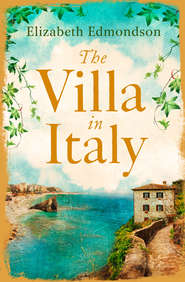По всем вопросам обращайтесь на: info@litportal.ru
(©) 2003-2024.
✖
The Frozen Lake: A gripping novel of family and wartime secrets
Настройки чтения
Размер шрифта
Высота строк
Поля
There was a clunk as Lipp laid the receiver down; far away in London, Jane could hear the click-clack of Lipp’s heels receding into the distance as her mother-in-law’s maid went upstairs.
Lipp must have left the receiver too close to the edge of the table, for there was a rustling sound and a thump, then more bangs. The receiver dangling on its cord, no doubt, swinging to and fro, and banging against the table leg as it did so. There was a harsh crackle down the line, further bumps and bangs, and then she heard Caroline’s voice.
‘Jane?’
‘Shall I put this one down now, my lady?’ cut in Lipp’s voice.
‘Yes,’ said Jane and Caroline together. Crash.
‘That terrible woman,’ Jane said, under her breath.
‘What did you say? Nothing? I distinctly heard you speak. Never mind. How is Saul?’
‘Perfectly well. He wants us to come to Wyncrag for Christmas.’
Caroline’s crystalline tones came down the line, as clear as though she were standing beside her; Caroline’s voice was like that on the telephone. ‘I was expecting you. When are you coming?’
‘Saul hasn’t decided. He intends to drive down, so he’ll be anxious to get away from London in good time before the Christmas exodus starts. One day next week, I’ll let you know. Perdita breaks up this week, I suppose. Who else will be there?’
‘Edwin wants to persuade Alix to come.’
‘Alix! Good heavens, after all this time? Have you heard from her?’
‘I’ve heard of her, which is quite enough. It seems that she’s fallen into unsuitable company.’
‘Alix is old enough to decide what company is or isn’t suitable for her, Caroline. She’s no longer a child. If you set into her the moment she steps into Wyncrag, you may find she turns straight around and leaves. I would.’
‘I hardly think your opinion on this subject is of any importance.’
Nor was her opinion on anything else, not as far as Caroline was concerned.
‘Besides, I have no expectation of her coming.’
The sound of the receiver being put down, a pause, and then another voice quacked at her. ‘You have upset Madame.’
Lipp again.
‘Madame’s upset me.’
‘She is no longer young, you should have consideration.’
‘Thank you, Lipp. Is there anything else you want to say?’
‘Madame wishes you to go to Bond Street and collect some linen she has ordered. You may bring it up with you in the car.’
‘Goodbye,’ Jane said firmly. She replaced the receiver with deliberate care, and then sat absolutely still, hands folded in her lap. Not a hair was out of place; from her elegant grey shoes through her pale grey skirt and cashmere grey twinset, worn with a restrained diamond brooch, to her faultless face and sleek jaw-length hair, she was a picture of perfection.
Outside, all was calm. Within, she seethed. She longed to hurl the telephone across the room, to bang her hands on the table, to yell and stamp. Wyncrag. How she hated Wyncrag. Almost as much as she hated the Surrey house with its ridiculous half-timbering and pompous attempt to look like a real country house. Almost as much as she hated this flat, with its spindly French furniture, its valuable rugs and pictures and mirrors. Perfect. Sterile. Appropriate. Just as she was the perfect, most appropriate wife imaginable for an up-and-coming politician.
She flipped open the cigarette box and jammed a cigarette between her lips. She lit it with the heavy silver table lighter, shaped like a tureen, loathsome thing, and flipped open a copy of Country Life, jerking through the pages filled with photographs of desirable properties for sale.
Her eyes fell on a small, black and white picture. Impey Manor, she read. Fifteenth-century manor house with many original features, in need of modernisation and improvements. Gardens, garaging, stabling, maze, small lake, paddocks, nine acres in all.
In your dreams, she thought. In those dreams where she lived in shabby comfort in the country, in a mellow old house, full of twisting passages and unexpected stairs. Dogs. Ponies. Doves fluttering around a dovecote. Winter mud and ice; sudden spring; the deep smells of summer, newly cut grass, hay, roses; autumn trees in a blaze of colour. Children in gumboots swishing through the fallen leaves.
That was the knife twisting in the wound. To linger in such dreams was unendurable. She dragged herself back into the actual world of here and now. Forget manor houses and the country and roses, she told herself.
Children.
The children Saul wouldn’t let her have. Or, rather, the children Saul’s mother didn’t want her to have, since she and her husband were cousins, and the dangers of inbreeding, as Caroline so charmingly put it, not worth risking.
She slammed the magazine shut, got up, drawing ferociously on her cigarette, making mental lists. Saul first: his man would see to his clothes. His skates, were they here or at Wyncrag? Binoculars. Books, presents, she would have to finish her shopping in a hurry. Her mind skittered from thing to thing. The evening dress that needed altering. Her engagement diary, day after day over Christmas and New Year filled with cocktails and dinners and dances; every one to be cancelled, apologies to be made, ruffled feathers smoothed, every word watched. Any carelessness could mean a vote lost.
Time spent in Saul’s constituency was always time spent walking on eggshells. Dammit, she’d have to lie and deceive. ‘Sir Henry, Mr Richardson’s father, not too well.’ How ridiculous, his father was always as fit as a flea, with the energy of three ordinary men. Saul’s constituents weren’t to know that, thank God he sat for a southern seat.
His mother then? Lady Richardson? They’d picture a fragile beauty, walking with a stick, silvery hair, a faded rose. Let them picture, provided they never set eyes on the short, powerful woman with her hooded, hawk’s eyes and hair still showing the traces of the rich chestnut colour of her youth. What would bring Saul more sympathy, rushing to his mother’s or his father’s side?
How tired she was of the whole wretched business; to think how pleased she’d felt when he’d been elected, when his delight in it had been so open, more like the thrill of a little boy given just the present he wanted than a grown man embarking on a political career.
She stubbed out her cigarette with restrained violence, then rang for her maid.
FOUR (#ulink_8cd1f9eb-b8b1-5168-97ab-6992cee4fb3b)
SS Gloriana, at sea, the Bay of Biscay
The waves were long and deep, and dark beneath the foamy carpet of spray. Hal Grindley’s mackintosh was bunched tightly around him, its collar up, its deep pockets a refuge for his icy hands. He wore no hat; the wind would have whipped it off in a second.
He was standing at the same place at the rail on the third deck where he had stood every night of the voyage since the first day out from Bombay. From there he had watched an enormous moon rise over a gleaming dark sea, and had seen the southern stars give way to the more familiar northern constellations shining with pinpoint brilliance in icy December skies. There, evening after evening, he had felt in its full intensity the strange suspension of reality belonging to a sea voyage. There he had thought about Margo, night after night, trying to order his feelings, to lessen the hurt, to regain a sense of proportion.
She had been with him in his mind all those months since his departure from San Francisco; she was beside him in his dreams as he crisscrossed Australia, as he tossed and turned in the sweltering heat of summer, as he sat outside on verandahs in India, listening to the eerie night sounds of the east. Finally, as the seas grew more grey and rough, he had reached the state of indifference he had longed for. A door slammed behind him, shutting away all the years he had spent with her, reducing her betrayal to no more than the hissing breaking of a wave, spray tossed into the air and vanishing in the mass of water.
Tonight, as the SS Gloriana forged her way through the heaving seas of the Bay of Biscay, there were no stars to be seen.
A door opened further along the deck, and he caught the vanishing sounds of chimes summoning passengers to dinner. With a last look out into the blackness of the night, he went back in to warmth and light and the steady hum of the ship’s engines. He made his way to his cabin to shed his coat; he was already dressed for dinner, although he had disarranged his black tie by fastening the collar of his mackintosh close about his neck. He twitched the tie back into place and set off once more to make his way along the swaying corridor, not at all bothered by the plunging motion of the vessel.
The vast dining room was sparsely filled. A steward at his elbow deferentially whispered in his ear that normal seating arrangements had been set aside for the present, as so few passengers were dining. He allowed himself to be escorted to a table where a handful of people were already seated; they gave him the confiding smiles of those immune to seasickness.
The little wooden guards, designed to stop the silver and china sliding to the floor, were up on all the tables, and as the waiter pushed his seat in and he reached for his napkin, the glasses at his place rattled into each other. The waiter deftly set them to rights. Hal spread the thick linen napkin across his knees and turned his attention to his table companions.
It was inevitable that one of those seated at the table was Lady Gutteridge. She was the wife of the Governor of the Central Provinces, bringing her girls back to prepare for the Season next year. Nothing short of an Act of God could subdue her immense vitality, and certainly she would stand no nonsense from mere waves. He wondered if her two daughters were glad of the chance to stay in their cabins, shut away for a few hours from the relentless supervision and chivvying of their demanding mother.
Both girls had paid Hal some attention in the sly snatches of time when no watchful maternal eye was upon them. One of the girls had judged him too old to be interesting, he was too sure of himself, had too hard a core to be played with. The other was fascinated, drawn to him by the very qualities that repelled her sister, delighted with his lean, dark looks. His sardonic expression made her shiver, and when he was amused, with his almost black eyes gleaming and that mobile mouth set in a slanting smile, she found him deeply disturbing.
Was he going to be in London for the Season? she wanted to know when she cornered him during a game of deck quoits.
Wasting her time, her sister told her. Hal Grindley, whoever he was, certainly wasn’t going to figure on Mummy’s List, why, they knew nothing at all about him or who his people were. He was reticent on the subjects of school and regiment and university, those pillars of status, and his clothes defied classification, though his well-cut evening clothes could only have come from the hands of a London tailor – but what about those yellow socks?
Rumour had it that he came from the north of England, that he had been living in America and travelling about all over Australia and God knew where; definite signs of not being any kind of an eligible partner, neither for a dance nor for life.









